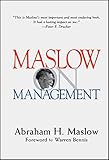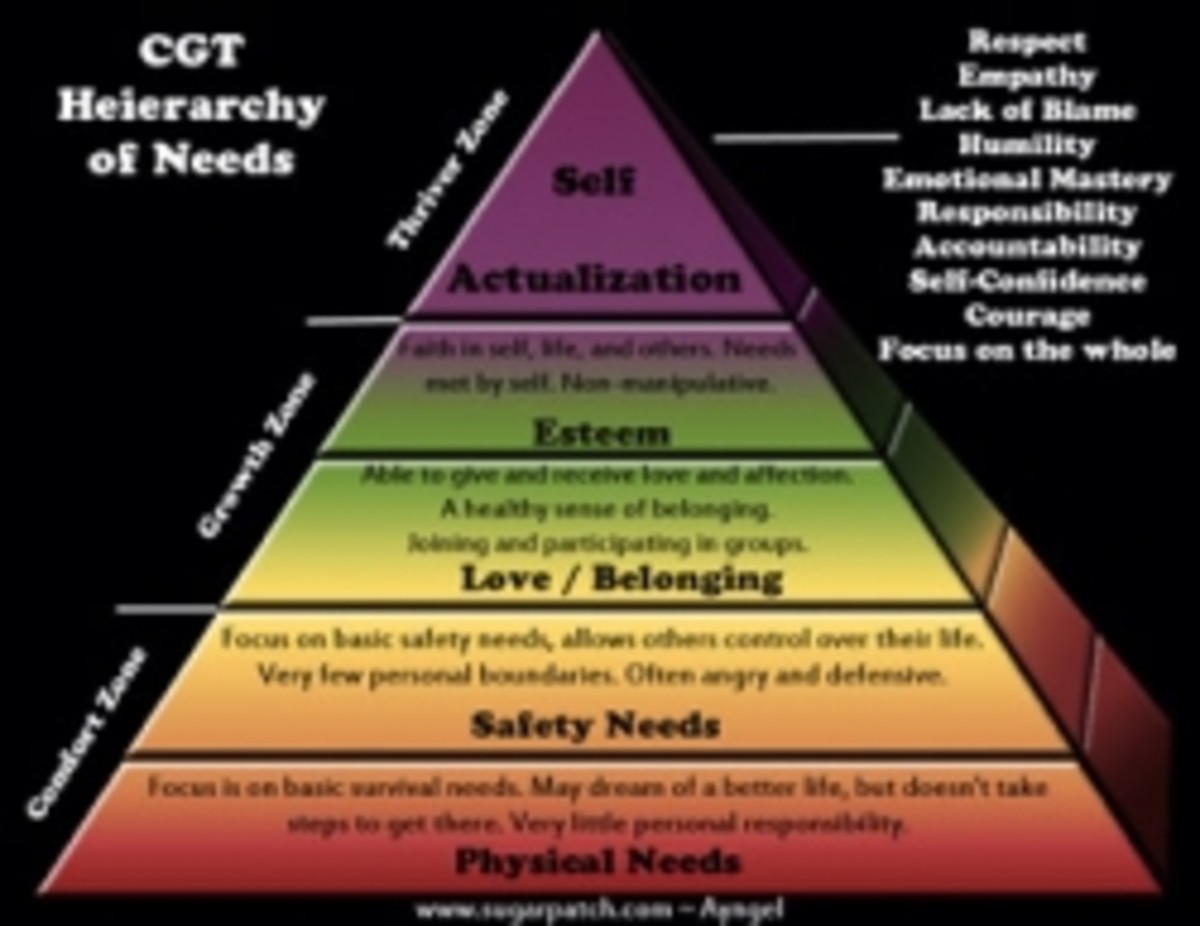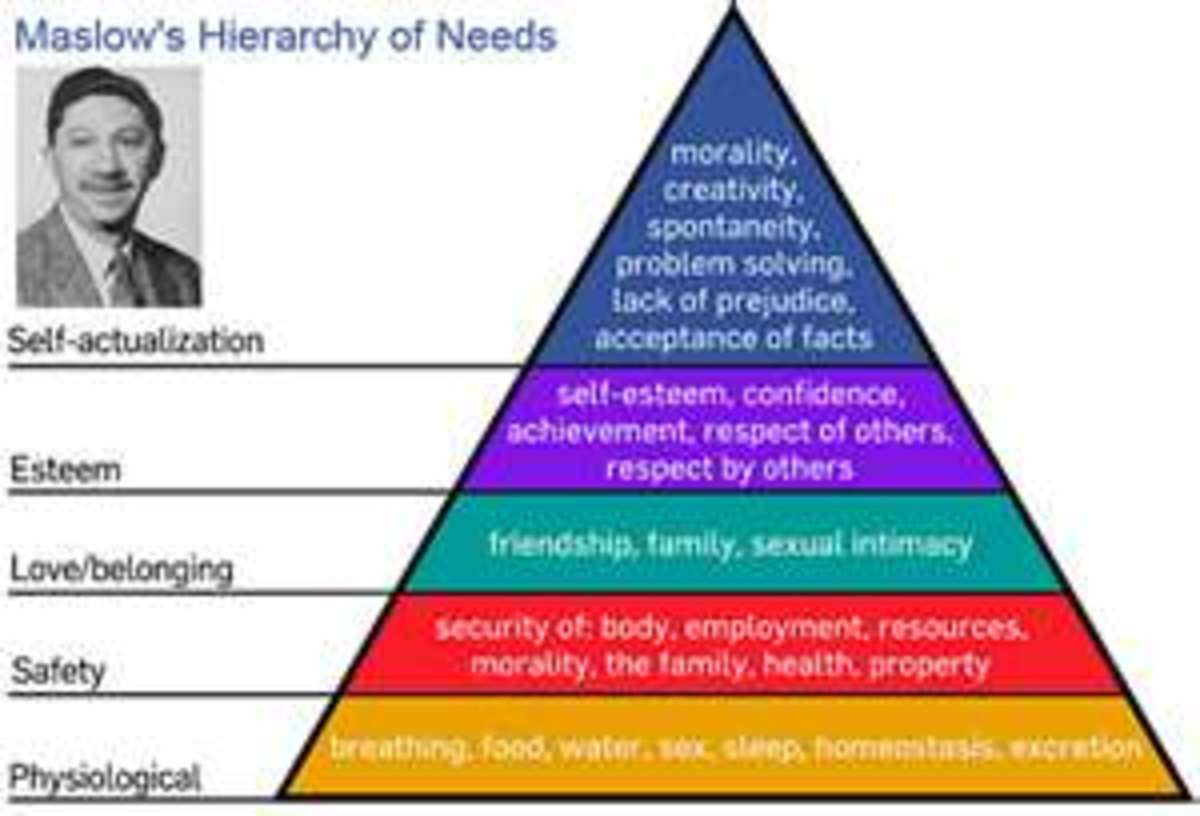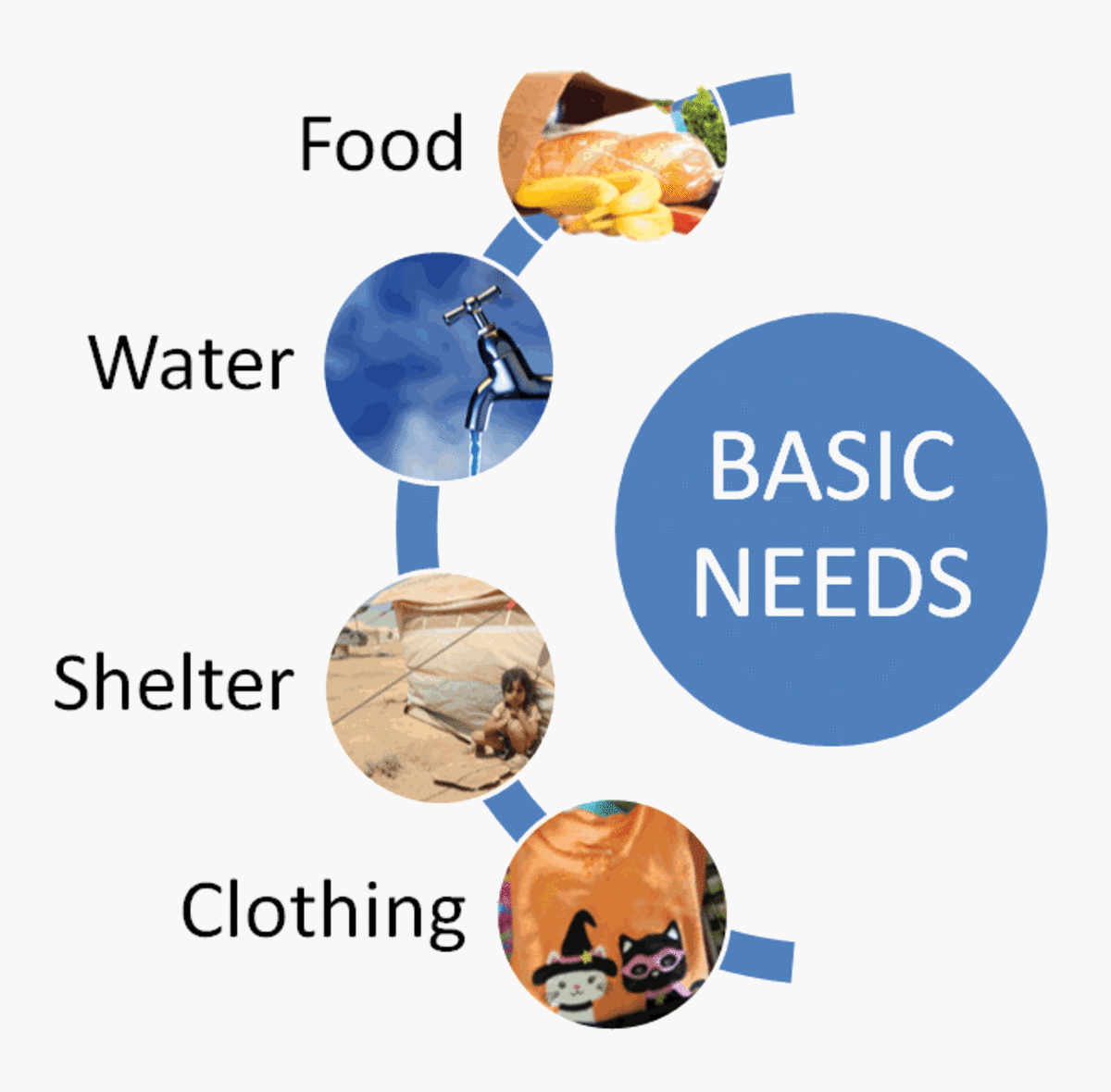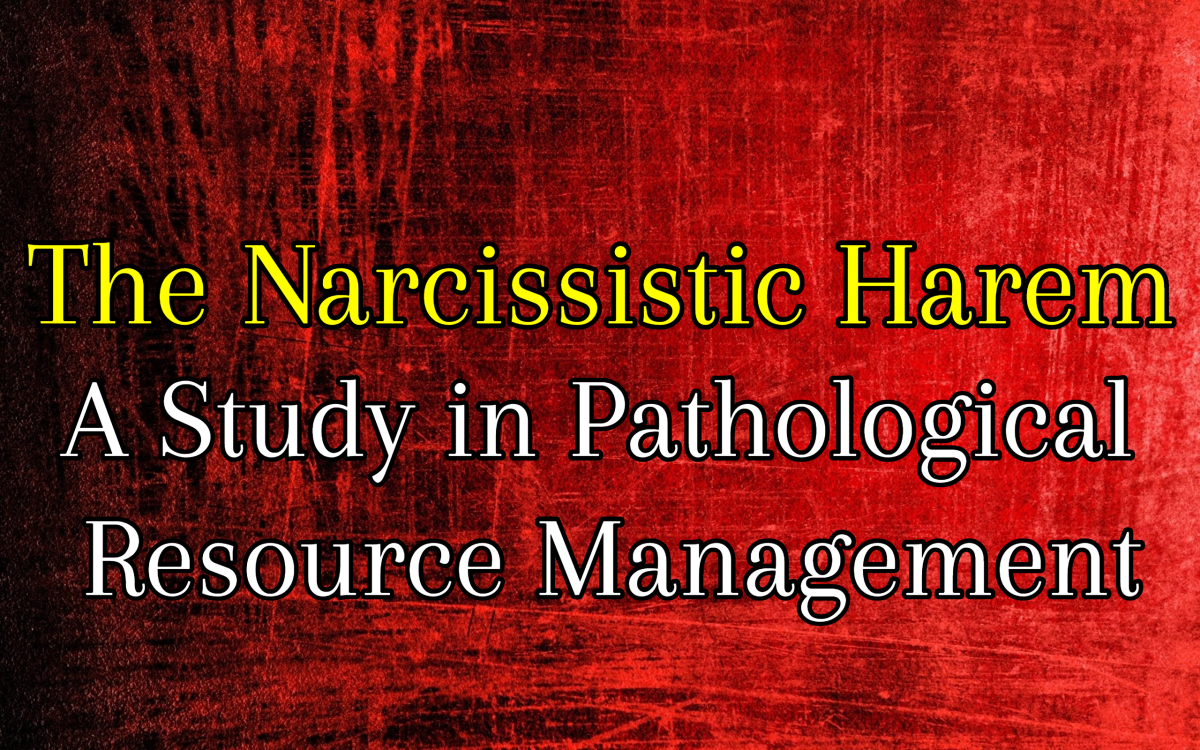Maslow's Hierarchy of Needs Revisited
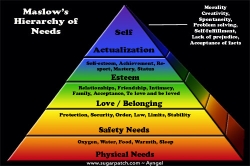
Maslow and Human Needs Revisited
What motivates you?
Do motivations change?
If something motivated you yesterday, will it still motivate you today?
According to psychologist Abraham Maslow, human motivation isn't really as complex as most people think it is. Maslow believed that human motivation is driven by human needs.
We all have needs that must be met, and those needs exist on a spectrum. According to Maslow, that spectrum is the same for all human beings, the only difference is where we all reside on that spectrum at any given time.
Many people want to improve their lives, but they don't know where to start. Maslow's theory can help, once you understand it.
This is Maslow for the rest of us.
The Science of Motivation
Though this video doesn't mention Maslow, the thought is there...
What Maslow's theory illustrates is the basic process of human growth, but it defines so much more. It is what divides the successful from the unsuccessful, the dreamers from the doers, and the miserable from the truly happy.
Some for one reason or another just seem to get stuck in the lower levels, they may dream of success but it seems too far out of reach. They may never be able to move out of the comfort zone without examining their life thoroughly.
The growth zone is perhaps the most difficult phase of this process. It requires being open to new thoughts and ideas, seeking out solutions to problems, and taking control of your life out of the hands of others.
After a time even this phase becomes uncomfortable, you begin looking forward to the next steps in the ladder. When your life feels more balanced, you have time to seek out other important parts of life. The search for knowledge, for beauty, for truth, for spirituality.
Maslow's hierarchy can be applied to many situations in life, to understanding yourself, understanding others. An animal does whatever it takes to survive, and a human will do so as well. Unlike an animal, humans were born with more than just the basic needs for survival.
We, as humans, need to be in a constant process of growth or change. When we begin to stagnate, we feel restless. When we feel restless, it is a sign that it is time to evaluate our life and see if it is time to move to another level of the pyramid.
In what I call the comfort zone, you find Maslow's basic needs. These are the minimum needs that must be met in order to exit survival mode.
The basic needs for survival are found here, a deficiency in any of these areas places a person in survival mode.
Many of the people in our world today are struggling to survive.
Without adequate food or water, survival becomes a daily struggle just to meet the very basic of needs. Poor, homeless, war torn countries. These people barely have enough of their needs met to survive, so it is easy to see where their focus will lie.
Many of us in this country are struggling right now. Our economy is suffering, people are losing jobs, homes, stability. While we might not be struggling at the same level as someone who is living on the streets and eating out of garbage cans, many of us have had to refocus our lives this past few years.
Things that were important to us not too long ago, are now considered luxuries. We are forced to differentiate between wants and needs on a constant basis. While our focus may have been on the higher levels in the past, certain circumstances can force us back to these lower needs.
We are constantly forced to reexamine our lives, there is no guarantee that you will rise above these basic needs and never have to worry about them again. Serious health problems, natural disasters, global financial instability, these things can easily force us back into survival mode.
People living in dangerous situations may also fall back down into the lower tiers. Even as a country victimization can push us back down the ladder. September 11th and Hurricane Katrina affected not just those who were touched personally, but nationally and globally we all began worrying about our safety and security again.
Slowly, we can work our way back up, but nobody wants to stay on these levels for long if they can help it. It is a life, but living in fear it isn't really living.
Then comes the need to love and be loved, to be comfortable with themselves and their abilities. These are the esteem needs, or what I called the growth needs. Where we learn the tools necessary to continue growing and changing. Where we find reasons to do the things we wish to do with our lives.
It is my belief that this is where most people find themselves stuck. Though Maslow ranked them as loving and belonging THEN esteem, it is very difficult to feel loved, or feel like you belong when you suffer from low self-esteem. These two levels often go hand in hand for that reason.
Low self-esteem can form as a result of feeling abandoned, abused, or neglected. It can stem from excessive criticism, lack of support or encouragement. It does not require severe abuse or neglect, or a major traumatic event. It can be the result of repeated teasing, or rejection as well.
Low self-esteem has far reaching consequences. It leads to addictive behaviors, relationship problems, eating disorders, social anxiety disorders, communication difficulties, and sexual promiscuity. The very thing people turn to to temporarily raise their self esteem can often rebound to lower their self-esteem even further.
We may want to love, to belong to a group, to be accepted, but we must also strive to love and accept ourselves at the same time or we never really feel like we belong anywhere.
A key word here is also healthy.
When we are healthy, we are able to give and receive healthy love and affection. To really feel like we belong. The confidence to join and participate in groups. Without confidence we often go through the motions, but it never feels quite right.
Esteem is crucial to this equation. A faith in yourself, in your life, and in others will enable you to exit your comfort zone and sample what life has to offer. Knowing that you are capable of meeting your needs on your own, that you don't have to manipulate others to have your needs met.
Growth is a process, it does not just happen. Growth takes time and effort, but the rewards are immense.
Maslow found that true happiness in life is relative to a persons position on the hierarchy. A person on the lower level may find happiness in simply having warm clothes and food to eat. As they move up the pyramid, happiness depends on different things.
Most people truly want to be happy, but as a goal it is often difficult to define exactly what true happiness is. It is different for each of us, there is no one thing that will make everyone happy.
In studying happy and successful people Maslow set out a blueprint of sorts.
A happy (self-actualized) person:
Understands reality, and accepts responsibility for it. Does not feel threatened by the unknown.
They possess an above average ability to use reason, and to see truth.
They are aware of their strengths and their limitations, and the strengths and limitations of others and accept them.
They are capable of great objectivity, aware of and sensitive to others.
Greater capability to focus on the solution instead of the problem.
Often focused on problems outside of themselves, willing to work toward solving greater problems.
They understand the difference between good and evil, and can distinguish between means and ends.
Do not twist their views in ways that hurt themselves or others.
They are honest, and possess a democratic character.
They tend towards the equality of all human beings, and that every individual has a right to be heard.
Perceive and understand human nature. They accept themselves, others, and circumstances for what they are.
Able to be friendly with anyone and learn from anyone.
A fresh appreciation of people, and appreciate the best aspects in all things.
Do not hold on to stereotypes, or conformity to culture.
Intimate relationships tend to be profound, and sincere rather than superficial.
Interested in deeper and more meaningful relationships.
Can be alone without being lonely, they desire solitude and privacy at times.
Uses quiet time for quiet reflection and private thought, not uncomfortable with silence.
Believe in self, who and what they are, are capable of making decisions and doing things on their own.
Emotionally intelligent, do not need manipulation, guilt, or shame to get what they want.
Greater range of emotional responses to situations.
Thoughts and actions are determined by their own internal moral standards, uninhibited by convention or conformity.
Seek unity and wholeness. Able to merge opposing views into a third possibility, reducing conflict.
They possess an inborn uniqueness that carries into all they do.
Highly creative, art, writing, music, or other creative pursuits are common.
They are highly spontaneous, and have no unnecessary inhibitions.
A natural simplicity, not interested in being who others think they should be.
Child-like approach to life. Finds joy in what is simple and natural, seeks out beauty and serenity.
Still able to enjoy the things of childhood yet retain wisdom of adulthood.
Capable of living moment to moment, life life to the fullest.
Peak experiences come frequently, when they can clearly see what was hidden or clouded before.
Healthy sense of humor, capable of laughing at themselves, no need to use humor that harm others.
Typically seen as good natured, but capable of great seriousness.
Motivated to continual growth throughout their lifetime.
Understand there are always new things to learn and new ways to grow.
Though comfortable with themselves, they never stop growing.
More Information on Self-Actualization
If you find this concept interesting there is a great deal of information available on how Maslow's theory applies to the average person.
- Self-Actualizing and Beyond
Selected quotes from Chapter Three of The Farther Reaches of Human Nature, by Abraham H. Maslow - Self-Knowledge Learning Needs vs. Self-Actualization Skills
How to Make the World a Better Place Chapter 8 ~ Emotional Literacy Education. Self-actualization is the process of growing neurological connections in the Learning Network of the brain, which results in the creation of specialized functions. - Self-Actualization in Action
He studied self-accepting, self-aware, spontaneous people (like Abe Lincoln) who knew how to be happy. Here's how to apply Maslow's hierarchy of needs to everyday life.

Who is Abraham Maslow?
Abraham Maslow is recognized as the father of humanistic psychology. Instead of studying unhealthy people, he studied healthy individuals, and tried to define positive mental health.
Maslow's Basic Principles:
1. The normal personality is characterized by unity, integration, consistency, and coherence. Organization is the natural state, and disorganization is pathological.
2. The organism can be analyzed by differentiating its parts, but no part can be studied in isolation. The whole functions according to laws that cannot be found in the parts.
3. The organism has one sovereign drive, that of self-actualization. People strive continuously to realize their inherent potential by whatever avenues are open to them.
4. The influence of the external environment on normal development is minimal. The organism's potential, if allowed to unfold by an appropriate environment, will produce a healthy, integrated personality.
5. The comprehensive study of one person is more useful than the extensive investigation, in many people, of an isolated psychological function.
6. The salvation of the human being is not to be found in either behaviorism or in psychoanalysis, (which deals with only the darker, meaner half of the individual). We must deal with the questions of value, individuality, consciousness, purpose, ethics and the higher reaches of human nature.
7. Man is basically good not evil.
8. Psychopathology generally results from the denial, frustration or twisting of our essential nature.
9. Therapy of any sort, is a means of restoring a person to the path of self-actualization and development along the lines dictated by their inner nature.
10. When the four basic needs have been satisfied, the growth need or self-actualization need arises: A new discontent and restlessness will develop unless the individual is doing what he individually is fitted for. A musician must make music, an artist must paint, a poet must write--in short, what people can be they must be.
More Maslow...

Symptoms of Inner Peace...
by Saskia Davis
An unmistakable ability to enjoy each moment.
A loss of interest in judging other people.
A loss of interest in judging self.
A loss of interest in interpreting the actions of others.
A loss of interest in conflict.
A loss of the ability to worry. (This Is a very serious symptom.)
Frequent, overwhelming episodes of appreciation.
Contented feelings of connectedness with others and nature.
Frequent attacks of smiling.
An increasing tendency to let things happen rather than make them happen.
An increased susceptibility to the love extended my others as well as the uncontrollable urge to extend it.
WARNING:
If you have some or all of the above symptoms, please be advised that your condition of inner peace may be so far advanced as to not be curable. If you are exposed to anyone exhibiting any of these symptoms, remain exposed only at your own risk.
How accurate do you believe Maslow's assessment is?
Do you agree with Maslow's assessment of human needs?





